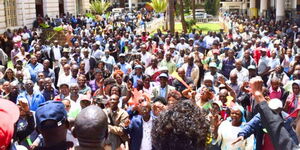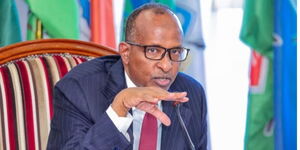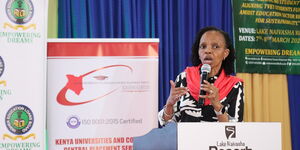Deputy President Prof. Kithure Kindiki has alleged that the Kenya Kwanza administration is the centre for the Judiciary’s recent efficiency gains, citing unprecedented judicial appointments, improved funding, and revived reforms that had stalled for over a decade as key drivers to the transformation.
Kindiki, who spoke on Friday, November 21, during the launch of the State of the Judiciary and Administration of Justice Report (SOJAR) for the 2024/2025 financial year, said no other administration had sworn in as many superior court judges within its first three years in office.
The Deputy President noted that President William Ruto had been scheduled to attend the event but sent his apologies, delegating him to represent the Head of State. Upon arrival at the Supreme Court building, he was received by Chief Justice Martha Koome and Deputy Chief Justice Philomena Mwilu.
He highlighted that the government had already sworn in 51 judges of the High Court and Court of Appeal, a figure he described as unmatched by previous administrations. Additionally, 40 more judges are currently in the recruitment pipeline, with an additional 45 expected to be hired next year.
Kindiki also alleged that there was a great confrontation between the executive and the Judiciary when they took power in 2022, where the previous regime had declined to swear in six judges hired to serve the Court of Appeal.
“I take pride to be associated with the progress we've made to try and increase the capacity of the judiciary to deliver service to the people of Kenya by providing necessary support and resources,” Kindiki asserted.
The Deputy President also revealed that the government is rapidly increasing the number of magistrates to ease case backlogs at the lower courts.
According to him, the Judicial Service Commission (JSC) has recruited 114 magistrates, and 100 more are in the process of being hired, bringing the total to 214 magistrates recruited in under four years.
He further noted that although Judiciary funding remains insufficient, the government has made progress.
“The budget for the Judiciary was 21 billion in 2022. The current budget, the chief justice has confirmed, is at 26 billion.” Kindiki stated.
He also announced that the government would fully operationalise the Judiciary Fund, which has remained inactive for 13 years, despite being a constitutional requirement.
Kindiki said work is underway to ensure the Judiciary can access and manage funds independently and efficiently.
“We need to look at the amount, the mechanisms for accessing it, and how to manage that money independently. We have taken the mandate to ensure there is a smooth understanding between the Judiciary and the offices in charge of disbursing the funds,” he explained.












